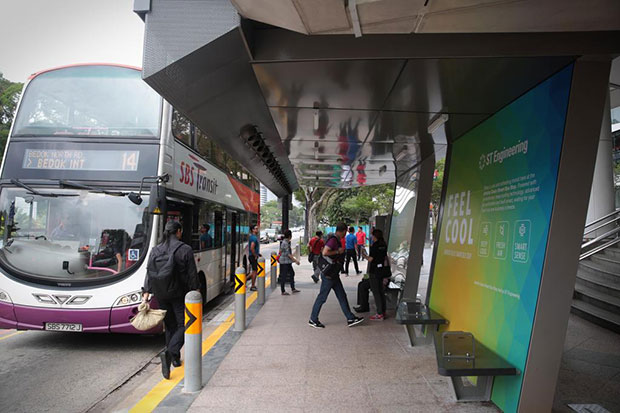
SINGAPORE: A “smart bus stop” offering cooler air and a closed circuit television to track commuter movements for suspicious activities was rolled out on Monday in front Dhoby Ghaut MRT Station, near Plaza Singapura.
Besides the usual panel showing bus arrival times, the bus stop also provides commuters real-time information on the air pollution levels in its vicinity, TODAY reported on Monday.
Developed over 18 months by Innosparks, a subsidiary of ST Engineering, the Airbitat Oasis Smart bus stop will be on trial for a year in front of The Atrium @ Orchard.
Equipped with an overhead air cooling and filtration system, the bus stop is aimed at helping commuters beat the urban heat and pollution.
The overhead vents at the bus stop blow air cooled to 24°C through the help of cold water. According to Innosparks, this technology called the Smart Cooler can result in energy savings of up to 70% compared to the average air conditioner of an equivalent capacity, and has been previously been deployed in attractions such as Resorts World Sentosa and Singapore Mandai Zoo.
While the air flowing out from the vents can be as low as 24°C, commuters will experience air temperatures around 3 to 4°C higher, due to differences in ambient temperature.
The filtration system can also trap up to 90% of harmful air particles in the air like debris, dirt and PM 2.5 particles, offering commuters cleaner air.
Embedded sensors in the panels of the bus stop help collect real-time data on pollution levels and ambient temperature, which will be displayed to commuters on digital screens.
The bus stop, which can accommodate around 30 people, comes equipped with a CCTV camera to detect suspicious activities such as unattended baggage and loitering.
Head of Innosparks Gareth Tang declined to reveal production costs, but said it costs on average S$0.60 (14 baht) an hour to operate, with Innosparks bearing the costs during the trial.
TODAY video
Office worker Ella Han, who waits for service 972 at the bus stop every day, gave it the thumbs’ up, saying: “I feel less tired waiting for the bus while the cool air blows at me.”
Adding that the bus stop is always very crowded and smelly due to the exhaust from the buses, she said: “I just hope that they can maintain (the cooling system) for a long time.”
While the cooled air is not air-conditioning, Singapore Management University student Jason Leung said it is still better than other bus stops which have no ventilation or fans at all.
Innosparks’ Tang said the location was chosen for the first trial due to its heavy traffic. He added that the one-year trial will allow the company to amass and collect data, which can be applied to develop other smart city solutions in the future.
He declined to give more details on future trials or whether the company is in talks to sell the solution.
The bus stop, however, will be collecting data on average commuter waiting times and commuter flow with real-time video recording, which Tang said will be shared with the Land Transport Authority (LTA) and other interested government agencies.
Through data collected from the bus stop technologies, and also surveys conducted of commuters, Innosparks will explore how its overhead air cooling and purification unit can be deployed at other locations in Singapore.
The LTA declined to comment when asked if the technology will be adopted at other locations around the island.
LTA’s group director for public transport Yeo Teck Guan said: “We welcome more local companies to test bed ideas that could help make commuting more pleasant.”